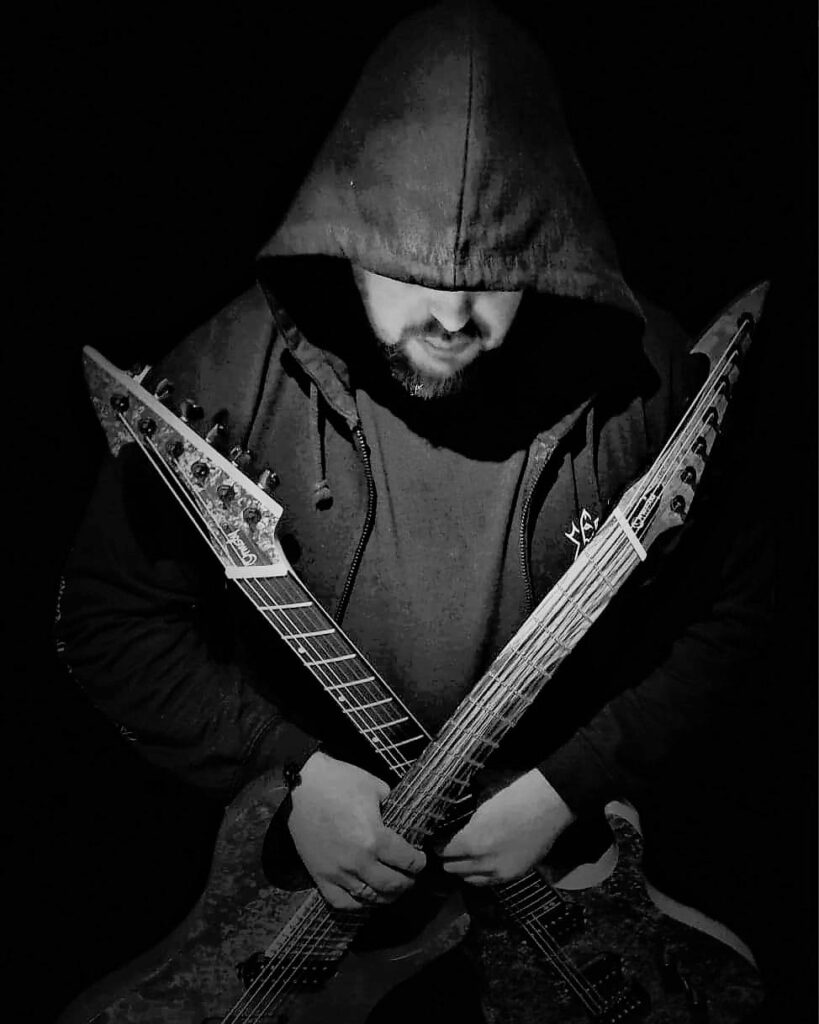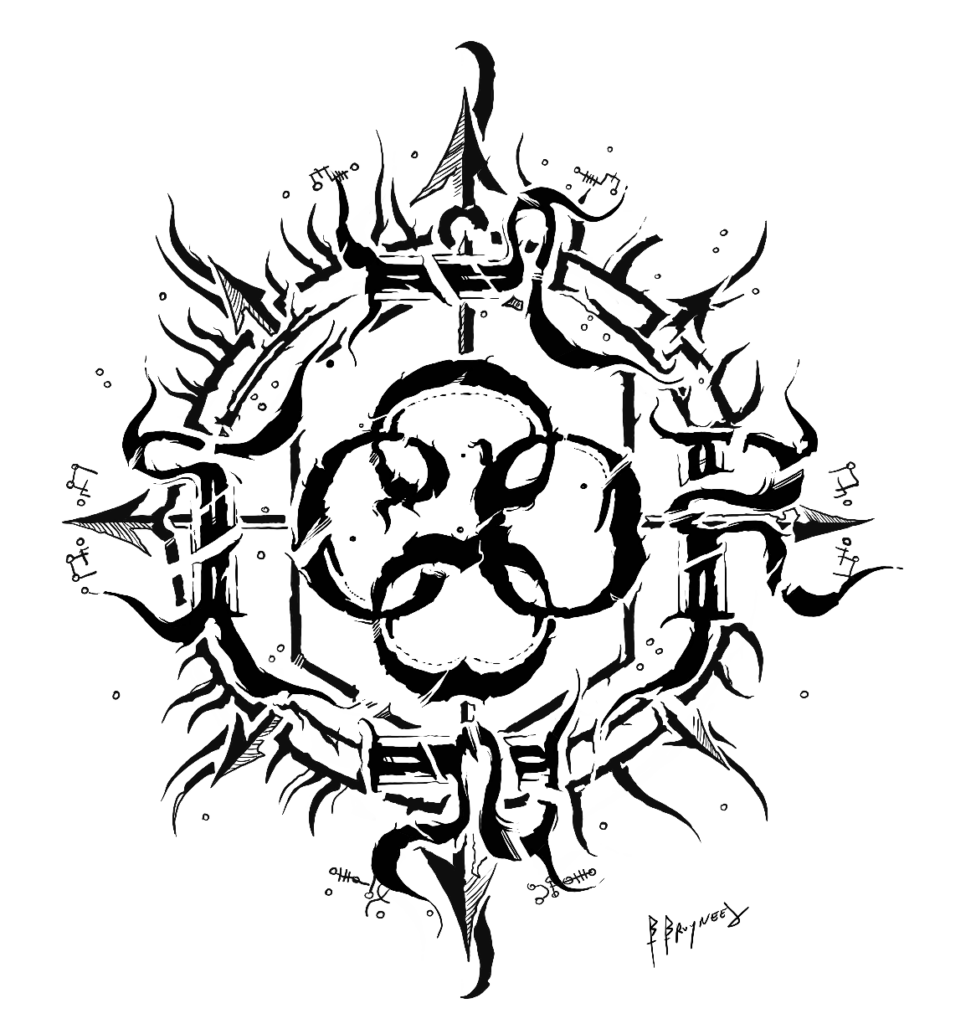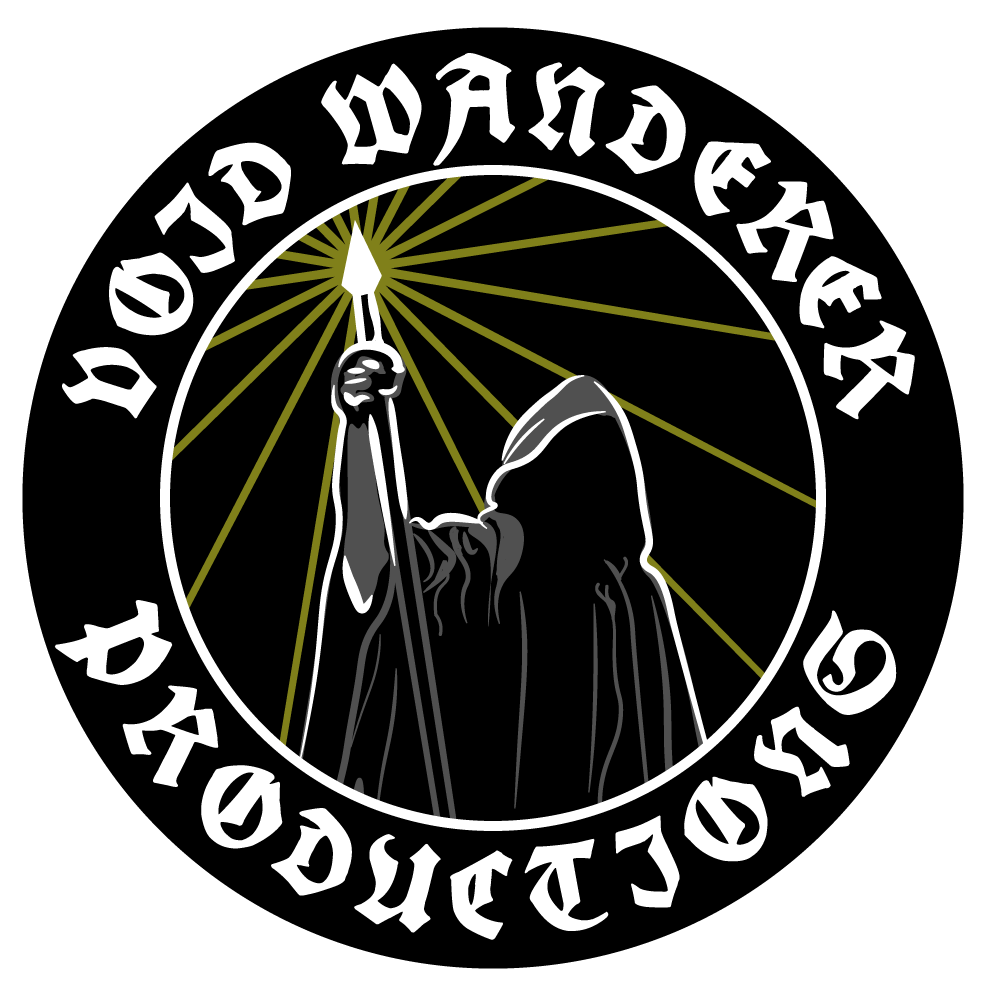
Gerhans Meulenbeld is one of the most involved people in the Zwotte Kring. Not only did he start The Color Of Rain, he also recently joined Meslamtaea and delivered solos to Schavot as a guest. He is also part of the Zwotcast team. We asked him how it all came about.
1. Hi Gerhans. You have been in music for some time, but in black metal you are a new name. Can you introduce yourself?
Of course! I am Gerhans, 34 years old and living in Vriezenveen (in the Twente region of the Netherlands) with my wife and son. I have been playing bass and guitar for 20 years and have played for years in bands such as Amped, Incission, As Empires Fall and Sad State of Decay. Nowadays I play guitar and write the music and lyrics for The Color of Rain and lead guitar for Meslamtaea. I also volunteer at a few festivals; Randrock, Vloek van Twenthe and the R&Ms Festival. I am a radio DJ at the Black Monday Radio Show, one of the 3 guys of the Zwotcast and I have recently started trying to write some reviews for Rock Portaal.
2. Your background in metal is more in deathcore and melodic death metal. This music, if you ask me, has a completely different starting point and aesthetic than black metal, and the fanbase is a different type of group. How do you see this? What appeals to you about black metal?
I’m originally more of a ‘core kid’ and only really got to know black metal later in life, although bands like Cradle of Filth and Dimmu Borgir were in my discman from an early age. In the past, the aesthetics between those genres were indeed miles apart, but nowadays there are more and more similarities, both stylistically and aesthetically. I have never really cared about genres, so one day I’ll wear a Fit for an Autopsy sweater and the next day a Mgła shirt. I think the point of metal is to break conventions and stigma. What appeals to me about black metal is often the atmosphere and the rebelliousness. The raw emotion that runs through it is something that seems to be more tangible in black metal than in other styles.

3. Can you unite your background in these death and core styles in the blackened music you write for The Color of Rain? How do you ensure that despite the far-reaching eclectic mix, the extremely dark atmosphere still prevails?
This comes much more naturally than might be expected when you listen to the music for the first time. My idea with The Color of Rain was to approach music more from an atmospheric point rather than purely based off riffs. For me, this starting point fits more into the black metal concept of music than those other styles. However, from my musical upbringing in the death and core styles, I do have a clear framework in which I approach the guitar myself. So this ‘clash of styles’ arose quite organically. The outlook of both the music and the lyrics is quite nihilistic and dark in nature. That ‘color’, the dark atmosphere, is always the starting point when I write new music. It’s not about the black metal style, the music is really too eclectic for that. It’s about the vibe and the message that one can really only compare to black metal.
4. Speaking of The Color Of Rain. Can you tell us something about its origins and what this musical group means to you?

The band was formed during the pandemic. I was looking for an outlet to express how I viewed the current state of the world. I had been in contact with Floris Velthuis for a while via the Facebook group The Rock & Metal Society and after sending some initial ideas, we decided to continue with this together as a project. Floris and I were very charmed by Devi Hisgen’s vocal approach to the work of Teitan and Cthuluminati. When Devi indicated that he also wanted to do this for us at TCOR, we immediately knew that he would be the man for the job!
The entire communication surrounding the debut album went so incredibly smooth. We were on the same page most of the time and that felt truly magical. This is still the case; we complete each other by working together and deepening our collaboration. It really feels like a dream team to be able to work with these gentlemen and in my own (not so) humble opinion this can also be clearly heard in the new work that will be released in 2024.
5. You write the lyrics for TCOR yourself. Lyrically, black metal from the past has been mainly negative, depressive, anti-religious or satanic. Do you deviate from these standard themes for TCOR?
Yes and no. In the sense that yes I do deviate from that theme because the lyrics, despite the Lovecraft influences, are much less imaginative. It is not ‘evil for the sake of being evil’ but much more contemplative in nature. The lyrics do have the same negative, dark message, but instead of most bands that attach a fantasy figure to this, our lyrics are steeped in nihilism. Conservatism, the evil of organized religion and the selfish nature of man are inspiration enough. Our world could have been so beautiful, but humanity ruins everything for the sake of its own convenience and the fear of others. We really make a mess of it. This is the same with faith and religion. From a humane point of view, these concepts should ensure that we treat each other a little better, but unfortunately we see that where love is preached, the message is often full of hate and accusing fingers. Wars, racism, hatred towards everything that is not straight and male; the dogmas and rules imposed by religions only create division. Instead of seeing us as a ‘human race’ you see more division than ever and we still put ourselves in boxes like “us” and “them”. The whole notion that we as humans are the center of the universe is outdated and insane, but unfortunately more current than ever. Nature, the universe, everything around us is cracking under our tyranny and would be better off without us. If we were more aware of this, we would interact with each other and the world very differently.
6. Are lyrics subordinate to the music or are they of great importance to you?
Lyrics are of vital importance to me. Music should cause friction, amaze, make one think. Without a message, music feels less sincere in my opinion. Not that you always need lyrics for a message; some instrumental music can tell just as much story with one melody line than an entire concept album. That said, singing and lyrics are indispensable for my music. The way Devi interprets and conveys the lyrics fits perfectly with how I envisioned this music. Like me, Devi is quite outspoken about our message. If we zoom out, everything we are so concerned about is less than a drop in the cosmic ocean; in less than a sigh it’s over. We want to convey that nihilistic message in our music and in our lyrics. Reflecting on the dark side of humanity and the awareness that life doesn’t revolve around us is, I think, very healthy and felt like catharsis for all of us.
7. The debut album “Oceans Above” has been bizarrely well received by the press. What were your expectations and what does this do to you?
I’m still blown away by how well everything is received. I never expected that music of such an eclectic nature would be picked up like that. Of course, we stand fully behind our art, but this, from the start, felt more like a passion project than something for a wider audience. It’s music that we especially wanted to hear ourselves. The danger there is that it quickly becomes less accessible. Fortunately, that concern turned out to be unfounded, because we have people from all kinds of sides and subgenres who embrace the music. The extremely positive reviews, the number of streams/views and most of all the overwhelming response from listeners (down to the 1st TCOR tattoo) are heart-warming.
8. TCOR is not a one-time project and has new material coming. What can you say about that now without revealing too much?
Yes! We just finished work on a split album that will be released next year. We’re doing this one together with another Zwotte Kring project and the 4 songs (5 if you count the intro) are definitely a step-up for us. The music goes beyond the beaten path even more than the debut, but I also think it sounds more focused. The atmosphere is even darker, as are the lyrics. There is a certain layering in the music that we are very proud of. In addition, we have really made a gigantic leap forward in terms of mix and master. Devi and Floris have really done a lot of work in this.
9. You played solos on Schavot for the “Verloren Vertellingen” 4-way split. How did this come about? Can you relate to this music, since Schavot is really traditional black metal?
As I mentioned earlier, the typical black clicked with me a little later. Nevertheless, bands like Cradle, Dimmu and Emperor have long been some of my favorites. I personally think Schavot is one of, if not the, coolest black metal to come from our own country. I honestly think that there are few projects or bands worldwide that know how to wrap that 90s black metal zeitgeist in a modern sauce more than Schavot does. When Floris asked me to write a solo for both songs, I didn’t have to think about it for a second. They practically wrote themselves. In any case, I believe in the idea that we are the scene together and am therefore a great supporter of such collaborations. I hope to be involved in more projects in the future!
10. In addition, you recently joined the unorthodox black metal group Meslamtaea as a permanent member, a band which has been operating in the Dutch underground since 1998. This is a completely different style of black metal, which regularly shakes hands with jazz and soul. What is your contribution to this band and do the different bands require a different playing style from you?
Yeah, cool, huh? I am really proud to be part of this. Even though I am a real fan of all of Ward and Floris’ bands and projects, Meslamtaea was my first contact with their work. The bleakness of the cover-art, the completely unique vibe the songs have: I was immediately impressed by this group. It is a completely different approach to music than how I normally write my parts. Therefore it’s great to be involved with. Working out my contributions as lead guitarist feels very adventurous and innovative. I learned a lot and had to brush up on my knowledge of jazz and fusion guitar. While the solos for Schavot wrote themselves, this was certainly not the case with Meslamtaea. Ultimately, I am very proud of the result of this new work. I tried to mix those vintage, jazzy sounds with a black metal aesthetic and keep it all in my own playing style, so I’m curious to hear the reactions!
11. You are also active in the field of radio and podcasts. What is it you do? As if that wasn’t enough, you are a moderator for the Rock & Metal Society and you are organizing a Festival. What do you want to say about this?
I can be heard on Black Monday Radio one or two evenings a month. A super cool radio show that revolves around old and new music within the metal and punk scene. I try to showcase newer work, pay attention to The Rock & Metal Society (bands from this society) and, above all, offer a stage to other Dutch bands. I regularly invite bands for an interview. Everything with a stocked fridge and, above all, a lot of shitting around and having fun.
In addition, Ward, Floris and I from the Zwotte Kring have just finished our first podcast, the Zwotcast. Here too, the idea is to give a platform to new music and especially Dutch talent from the black metal community. Very cool to do and the first podcast has been online since December 29.

The R&MS Fest premiered for the first time in November 2023. The Rock & Metal Society, of which I am an admin, is an extremely enthusiastic and fun group on Facebook filled with like-minded people. Unlike many other groups, this has really grown into a community, with members who have built a personal bond with each other, new music projects emerging and people visiting each other at concerts and at home! The wish arose to organize a meeting. Thanks to the ‘fine nine’ – as we as nine organizers have come to call ourselves – this meeting grew into a real festival at Popei in Eindhoven. It was an epic afternoon and evening with lots of fun and live music from 6 amazing bands from the group. Because it turned out to be such an incredible success, we immediately decided that it would not be a one-time event and the next edition is already planned for November 9, 2024, with 6 incredibly cool bands!
Interview: Floris
